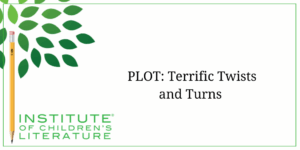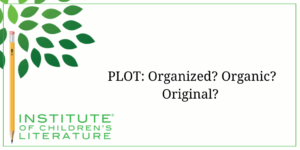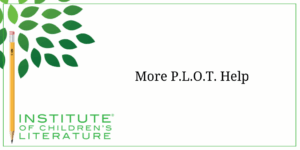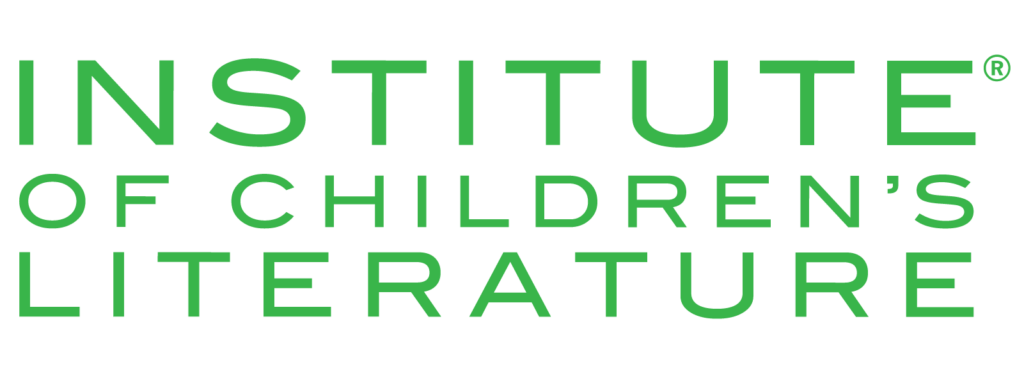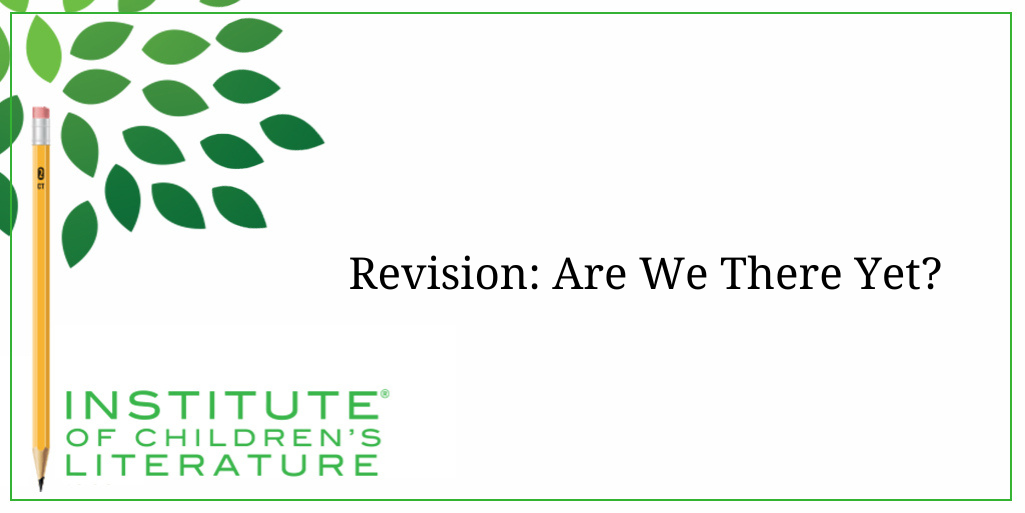
- Date: April 10, 2025
- Author: Jan Fields
- Category: Writing for Children Blog
- Tags: kidlit, manuscript, Revision, submission tips
We teach our students how to write and get published!
View our Course Catalog >
Revision: Are We There Yet?
Revision is one of those writing tasks that never feels completely finished. I have so many books in print, and I can pick up any one of them and find a sentence I wish I could rephrase or a bit of dialogue that I would love to tune. Knowing that can make it very tempting to be caught in a revision spiral that lasts forever. Is your revision ever really done?
The answer is that is must be if you want to be published. And it is far more common to rush revision than it is to hold onto it forever, still, it's good to know when it's time to stop. So, let's consider the best way to be sure you're done with revising and ready to submit. 
Did You Do All the Steps?
Revision needs a plan. Without one, you can flail around, correcting a few typos and trying to figure out whether your chapters need titles, but not really making your manuscript the best it can be. So think about the things that make a great story or an excellent non-fiction article and then methodically check to be sure those things are true of what you have written.
Work the process. Do all of the basic revision steps. Give the manuscript time to rest. Do whatever tricks work best for you to read like a reader instead of like a writer. Check for continuity (character named didn't change, specifics about them didn't change, details remained consistent). Examine the motivation of every character for every act. Make sure the ending grew logically from the story as a whole and the actions of the main character, specifically.
As much as possible, read the text aloud to listen for awkward phrasing. Having a revision checklist with specific passes gives you a procedure and that will go a long way to knowing when you're done. When you've done all the steps, and you're confident that you did them well, you are probably done.
Revoking Your Poetic License
One element of knowing that you're done with revision is checking on your justification for things you spotted—or your critique group spotted, or your beta reader spotted. Sometimes we come across a potential problem, or someone points out a potential problem, but we wave it away; “sure, it wouldn't happen like that in real life, but I'm using my poetic license.”
One of the steps of revision that needs to be completed before you can consider yourself done involves giving up that poetic license. Things in your story need to happen for a reason, and that reason must make sense within the context of the story you are telling.
 My daughter was trying to help a friend with a fantasy story she was writing. She kept asking her friend how the magic system in the story worked as it seemed inconsistent, and how the society of the story reacted to it didn't make sense. Magic was a key element of the story, and magic systems must always make sense. Sure, in the real world, such a thing doesn't exist. But if it did, it would follow certain rules, it would fit snuggly beside real world physics and would defy the rules only in specific ways and at specific costs. The magic would need to be fueled by something. And it would need limits.
My daughter was trying to help a friend with a fantasy story she was writing. She kept asking her friend how the magic system in the story worked as it seemed inconsistent, and how the society of the story reacted to it didn't make sense. Magic was a key element of the story, and magic systems must always make sense. Sure, in the real world, such a thing doesn't exist. But if it did, it would follow certain rules, it would fit snuggly beside real world physics and would defy the rules only in specific ways and at specific costs. The magic would need to be fueled by something. And it would need limits.
But the writer didn't want to think much about the magic. She wanted to think about the characters, which is admirable, but you really have to think about it all. So, the magic simply was. It didn't have parameters. It simply functioned whenever the author needed it to function and failed when the author needed it to fail. And as the writer plowed along, this lack of a system threw up more and more problems for the plot. Overusing her poetic license eventually caused her to drive the story into a wall and could only be corrected through a huge rewrite.
So, one absolute rule of your revision, before you call a story finished, is to be certain that nothing in the story exists just because you didn't want to think too hard about it. Nothing is simply convenient. Everything needs to make sense. The puzzle pieces need to fit.
Does It Meet Requirements?
There are certain requirements of books in order to be published. Publishers, for example, need books to be certain lengths because the length of a book affects its cost of production and affects its marketing. For example, a science fiction novel that is really short will disappear on the shelves of a bookstore, making it hard for readers to buy and find. A massively long middle grade contemporary novel will be expensive to produce and daunting to young readers. Some will tackle it—several of the Harry Potter books proved that—but if it's the first book in a series or is a stand-alone book, length can be a problem.
Length is just one element of what can make a book problematic. Very young readers, for example, tend to prefer books with a limited cast of characters. It gets hard to keep all the people separate in their heads. Books for teens tend to have some element of “coming of age” because that is such an essential part of being a teen. If you are defying the needs and interests of the reader, you need to be aware and be certain that you are doing it in a way that still meets the needs and interests of the reader, but in a new way.
What this requires is understanding what the requirements of age groups, genre, and book formats actually are. Where publishers were once open to books up to 1,200 words, it's rare to find a publisher that will pick up a fiction picture book that is over 500 words. And I've seen guidelines requiring books be no more than 300 words.
So, it's important to keep up with what is being published, who is publishing it, and what the requirements are, so that you'll know whether your manuscript has stumbling blocks that will make it hard to place. Then you can decide if you want to smooth those stumbling blocks away or look for the rare publisher who is open to pushing limits. 
Equally, you need to pay attention to what publishers say they want. If they say they'll look at a summary and the first chapter of a novel, but you send the whole thing with a teaser blurb, the publisher will turn you down even if they would have bought it had you done it right. They need submissions to be what they need.
Everyday nonfiction only publishers receive submissions of short story collection, poetry collections, and novels. They don't accept them. They can't. It doesn't fit. So, the last thing you need to do in your revision step is to understand what your completed piece is and where it fits. Don't try to cram a square peg into a round hole during submission. Recognize that your peg is square and seek our square peg publishers.
Final Read Through – Cut and Paste
It's often on the final read through that you really know if you're done. This is the read through where you realize the book is better than you feared it might be. It's the one where you put in words that you know you took out on the last pass. It's the one where you maybe catch a typo, but mostly you feel really good about the book. It's the one where you pick sections at random in a longer book and read them aloud, and don't cringe. At all. In a picture book, it's the section where you read it aloud, and can imagine reading it to a group of children in a library reading hour, and you don't cringe or fret.
In the last read through, you may still worry a little. We all worry. But there is no specific place where the worry lies, not in the text. And when you know you've looked at everything, and you don't know what else you could possible do—not because you can't figure out a fix, but because you don't see anything that needs fixing. That's when you're done. That's when it's ready. That's when you overcome the fear and begin the submission process. Be brave. Just do it. You're ready.
Related Articles for Revision & Submission
With over 100 books in publication, Jan Fields writes both chapter books for children and mystery novels for adults. She’s also known for a variety of experiences teaching writing, from one session SCBWI events to lengthier Highlights Foundation workshops to these blog posts for the Institute of Children’s Literature. As a former ICL instructor, Jan enjoys equipping writers for success in whatever way she can.

